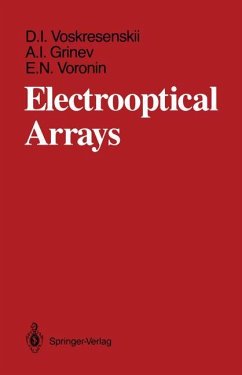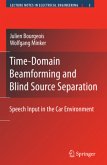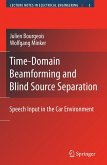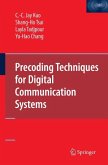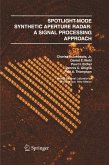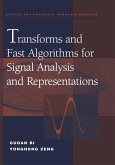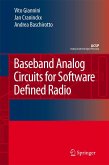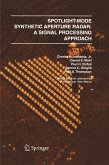Dmitrii I. Voskresenskii, Aleksandr I. Grinev, Evgenii N. Voronin
Electrooptical Arrays
Übersetzung: Priest, Peter F.H.
Dmitrii I. Voskresenskii, Aleksandr I. Grinev, Evgenii N. Voronin
Electrooptical Arrays
Übersetzung: Priest, Peter F.H.
- Broschiertes Buch
- Merkliste
- Auf die Merkliste
- Bewerten Bewerten
- Teilen
- Produkt teilen
- Produkterinnerung
- Produkterinnerung
Modern radar, telecommunication, sonar, and radio-astronomy systems use integrated systems, complex signals, and signal processing methods exten sively. These systems require the development of new, more efficient systems. One of the major ways to improve radar and sonar systems is to use multichannel systems, the most promising of which employ space-time signal processing. In the last few years the intensive growth in electronics, informa tion processing techniques, microwave and laser technology, electrooptics and holography, acoustics, and optoelectronics have resulted in new scientific and…mehr
Andere Kunden interessierten sich auch für
![Time-Domain Beamforming and Blind Source Separation Time-Domain Beamforming and Blind Source Separation]() Julien BourgeoisTime-Domain Beamforming and Blind Source Separation91,99 €
Julien BourgeoisTime-Domain Beamforming and Blind Source Separation91,99 €![Time-Domain Beamforming and Blind Source Separation Time-Domain Beamforming and Blind Source Separation]() Julien BourgeoisTime-Domain Beamforming and Blind Source Separation75,99 €
Julien BourgeoisTime-Domain Beamforming and Blind Source Separation75,99 €![Precoding Techniques for Digital Communication Systems Precoding Techniques for Digital Communication Systems]() C.-C. KuoPrecoding Techniques for Digital Communication Systems75,99 €
C.-C. KuoPrecoding Techniques for Digital Communication Systems75,99 €![Spotlight-Mode Synthetic Aperture Radar: A Signal Processing Approach Spotlight-Mode Synthetic Aperture Radar: A Signal Processing Approach]() Charles V. J. JakowatzSpotlight-Mode Synthetic Aperture Radar: A Signal Processing Approach279,99 €
Charles V. J. JakowatzSpotlight-Mode Synthetic Aperture Radar: A Signal Processing Approach279,99 €![Transforms and Fast Algorithms for Signal Analysis and Representations Transforms and Fast Algorithms for Signal Analysis and Representations]() Guoan BiTransforms and Fast Algorithms for Signal Analysis and Representations38,99 €
Guoan BiTransforms and Fast Algorithms for Signal Analysis and Representations38,99 €![Baseband Analog Circuits for Software Defined Radio Baseband Analog Circuits for Software Defined Radio]() Vito GianniniBaseband Analog Circuits for Software Defined Radio75,99 €
Vito GianniniBaseband Analog Circuits for Software Defined Radio75,99 €![Spotlight-Mode Synthetic Aperture Radar: A Signal Processing Approach Spotlight-Mode Synthetic Aperture Radar: A Signal Processing Approach]() Charles V. J. JakowatzSpotlight-Mode Synthetic Aperture Radar: A Signal Processing Approach191,99 €
Charles V. J. JakowatzSpotlight-Mode Synthetic Aperture Radar: A Signal Processing Approach191,99 €-
-
-
Modern radar, telecommunication, sonar, and radio-astronomy systems use integrated systems, complex signals, and signal processing methods exten sively. These systems require the development of new, more efficient systems. One of the major ways to improve radar and sonar systems is to use multichannel systems, the most promising of which employ space-time signal processing. In the last few years the intensive growth in electronics, informa tion processing techniques, microwave and laser technology, electrooptics and holography, acoustics, and optoelectronics have resulted in new scientific and technological research fronts. One of these is the theory and technology of electrooptical array antennas-a new class of receiving antennas whose pat tern is controlled by means of coherent optics and holography. Electrooptical array theory and technology have been involved in the study of the power, resolution, and range characteristics of arrays with various coherent opti cal processors. The practical applications of these systems and methods for building them using contemporary optoelectronics have also been studied.
Produktdetails
- Produktdetails
- Verlag: Springer / Springer New York / Springer, Berlin
- Artikelnr. des Verlages: 978-1-4612-8120-7
- Softcover reprint of the original 1st ed. 1989
- Seitenzahl: 344
- Erscheinungstermin: 30. September 2011
- Englisch
- Abmessung: 235mm x 155mm x 19mm
- Gewicht: 523g
- ISBN-13: 9781461281207
- ISBN-10: 1461281202
- Artikelnr.: 36116010
- Herstellerkennzeichnung
- Springer-Verlag GmbH
- Tiergartenstr. 17
- 69121 Heidelberg
- ProductSafety@springernature.com
- Verlag: Springer / Springer New York / Springer, Berlin
- Artikelnr. des Verlages: 978-1-4612-8120-7
- Softcover reprint of the original 1st ed. 1989
- Seitenzahl: 344
- Erscheinungstermin: 30. September 2011
- Englisch
- Abmessung: 235mm x 155mm x 19mm
- Gewicht: 523g
- ISBN-13: 9781461281207
- ISBN-10: 1461281202
- Artikelnr.: 36116010
- Herstellerkennzeichnung
- Springer-Verlag GmbH
- Tiergartenstr. 17
- 69121 Heidelberg
- ProductSafety@springernature.com
1 Array Antennas with Coherent Optical Signal Processing.- 1.1 The Potential for Parallel Processing of Space-Time Signals with Coherent Optical Techniques.- 1.2 Electrooptical Array Antennas. Background and State of the Art.- 1.3 The Components of an Electrooptical Array Antenna.- 2 Formation of Planar Array Antenna Patterns.- 2.1 Pattern Control Characteristics of Electrooptical Planar Arrays.- 2.2 Accuracy, Power and Range Properties of Electrooptical Arrays.- 3 Array Antennas with Space-Time Signal Processing.- 3.1 Pattern and Spectrum Shaping Characteristics of Linear Electrooptical Arrays Using Multichannel Acoustooptical Space-Time Light Modulation.- 3.2 Linear Electrooptical Array with Electron Beam and Optical Signal Addressing Input Devices.- 3.3 Coherent Optical Processors for Planar Array Antennas with Space-Time Light Modulator with a Complex Law for Addressing the Input Signal.- 3.4 Linear Arrays with Correlation Signal Processing.- 4 Formation of the Antenna Pattern of Nonplanar Array Antennas.- 4.1 The Restoration Algorithm.- 4.2 Implementing the Processing Algorithm with Coherent Optics.- 4.3 Random Axially-Symmetric Array Antennas.- 4.4 Phase Correction Method.- 5 Discreteness Effects in Planar and Nonplanar Electrooptical Antenna Arrays.- 5.1 Arbitrary Nonplanar Electrooptical Antenna Array.- 5.2 Effects of Discreteness of Planar Electrooptical Antenna Arrays.- 5.3 Effects of discreteness of cylindrical electrooptical arrays.- 6 Rejection of Interference by Coherent Optical Methods.- 6.1 Statement of Problem Choice of Criterion.- 6.2 Interference Suppression Processing Algorithm and Options for Its Implementation.- 6.3 Processor with Ideal Suppression of Spatial Noise Signals.- 6.4 Examples of Electrooptical Arrays with Noise Rejection.- 6.5Generalization of the Coherent Optical Method of Noise Rejection.- 6.6 Effect of Errors in the Realization of the Spatial Filter on the Depth of Null Formation.- 7 The Influence of Uncertainties on Electrooptical Arrays.- 7.1 The Electrooptical Array Antenna Gain.- 7.2 Coherent Optical Processor Errors.- 7.3 Space-time Light Modulator Distortion Factors.- 8 Electrooptical Array Sensitivity.- 8.1 Thermal Noise in Electrooptical Arrays.- 8.2 Quantum Noise in Electrooptical Array with Incoherent Photodetection.- 8.3 Quantum Noise in Electrooptical Array Antennas with Coherent Photodetection.- 8.4 Electrooptical Array Sensitivity Evaluation.- 9 Coherent Optical Processors for Electrooptical Array Antennas Examples Components Research.- 9.1 Coherent Optical Processor for Forming the Radiation Pattern of Planar Array Antennas.- 9.2 Coherent Optical Processors for Space-Time Processing of Linear and Planar Array Antenna Signals.- 9.3 Coherent Optical Processor for Planar Array Antennas with Rejection of Interfering Spatial Signals.- 9.4 The Circular Array Antenna Coherent Optical Processor.- 10 Conclusions Trends in Electrooptical Array Antenna Theory and Development.- A Circular Electrooptical Array Antenna Mask Synthesis by Digital Holography Methods.- A.1 The Complex Mask Transmission Function.- A.2 The Mask Structure.- A.3 The Mask Diffraction Efficiency.- A.4 Shifting to the Spatial Subcarrier Frequency.- A.5 Mask Recording by Digital Holography.- A.6 Numerical Evaluation of the Mask.- B Evaluation of the Diffraction Efficiency of Coherent Optical Processors.- C Notes on Calculating Extended Spheroidal Functions and Related Functional.- D Electrooptical Arrays Focused in the Fresnel Region.- D.1 The Reproduction Algorithm.- D.2 Planar Electrooptical Arrays.- D.3Linear Electrooptical Arrays.- D.4 Linear Electrooptical Arrays with an Optical Spectroanalyzer.- D.5 Cylindrical Electrooptical Arrays.
1 Array Antennas with Coherent Optical Signal Processing.- 1.1 The Potential for Parallel Processing of Space-Time Signals with Coherent Optical Techniques.- 1.2 Electrooptical Array Antennas. Background and State of the Art.- 1.3 The Components of an Electrooptical Array Antenna.- 2 Formation of Planar Array Antenna Patterns.- 2.1 Pattern Control Characteristics of Electrooptical Planar Arrays.- 2.2 Accuracy, Power and Range Properties of Electrooptical Arrays.- 3 Array Antennas with Space-Time Signal Processing.- 3.1 Pattern and Spectrum Shaping Characteristics of Linear Electrooptical Arrays Using Multichannel Acoustooptical Space-Time Light Modulation.- 3.2 Linear Electrooptical Array with Electron Beam and Optical Signal Addressing Input Devices.- 3.3 Coherent Optical Processors for Planar Array Antennas with Space-Time Light Modulator with a Complex Law for Addressing the Input Signal.- 3.4 Linear Arrays with Correlation Signal Processing.- 4 Formation of the Antenna Pattern of Nonplanar Array Antennas.- 4.1 The Restoration Algorithm.- 4.2 Implementing the Processing Algorithm with Coherent Optics.- 4.3 Random Axially-Symmetric Array Antennas.- 4.4 Phase Correction Method.- 5 Discreteness Effects in Planar and Nonplanar Electrooptical Antenna Arrays.- 5.1 Arbitrary Nonplanar Electrooptical Antenna Array.- 5.2 Effects of Discreteness of Planar Electrooptical Antenna Arrays.- 5.3 Effects of discreteness of cylindrical electrooptical arrays.- 6 Rejection of Interference by Coherent Optical Methods.- 6.1 Statement of Problem Choice of Criterion.- 6.2 Interference Suppression Processing Algorithm and Options for Its Implementation.- 6.3 Processor with Ideal Suppression of Spatial Noise Signals.- 6.4 Examples of Electrooptical Arrays with Noise Rejection.- 6.5Generalization of the Coherent Optical Method of Noise Rejection.- 6.6 Effect of Errors in the Realization of the Spatial Filter on the Depth of Null Formation.- 7 The Influence of Uncertainties on Electrooptical Arrays.- 7.1 The Electrooptical Array Antenna Gain.- 7.2 Coherent Optical Processor Errors.- 7.3 Space-time Light Modulator Distortion Factors.- 8 Electrooptical Array Sensitivity.- 8.1 Thermal Noise in Electrooptical Arrays.- 8.2 Quantum Noise in Electrooptical Array with Incoherent Photodetection.- 8.3 Quantum Noise in Electrooptical Array Antennas with Coherent Photodetection.- 8.4 Electrooptical Array Sensitivity Evaluation.- 9 Coherent Optical Processors for Electrooptical Array Antennas Examples Components Research.- 9.1 Coherent Optical Processor for Forming the Radiation Pattern of Planar Array Antennas.- 9.2 Coherent Optical Processors for Space-Time Processing of Linear and Planar Array Antenna Signals.- 9.3 Coherent Optical Processor for Planar Array Antennas with Rejection of Interfering Spatial Signals.- 9.4 The Circular Array Antenna Coherent Optical Processor.- 10 Conclusions Trends in Electrooptical Array Antenna Theory and Development.- A Circular Electrooptical Array Antenna Mask Synthesis by Digital Holography Methods.- A.1 The Complex Mask Transmission Function.- A.2 The Mask Structure.- A.3 The Mask Diffraction Efficiency.- A.4 Shifting to the Spatial Subcarrier Frequency.- A.5 Mask Recording by Digital Holography.- A.6 Numerical Evaluation of the Mask.- B Evaluation of the Diffraction Efficiency of Coherent Optical Processors.- C Notes on Calculating Extended Spheroidal Functions and Related Functional.- D Electrooptical Arrays Focused in the Fresnel Region.- D.1 The Reproduction Algorithm.- D.2 Planar Electrooptical Arrays.- D.3Linear Electrooptical Arrays.- D.4 Linear Electrooptical Arrays with an Optical Spectroanalyzer.- D.5 Cylindrical Electrooptical Arrays.

